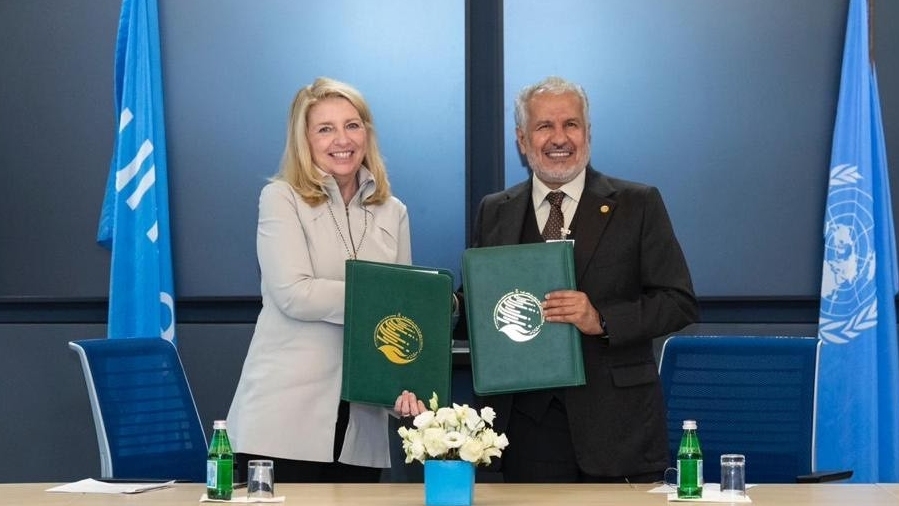Unicef promoted Saudi partnership as reports emerged of schoolgirl jailed for tweets

The United Nations Children's Fund (Unicef) said it was "grateful" to be working with Saudi Arabia on the same day activists raised concerns about a schoolgirl jailed by a notorious Riyadh court for 18 years for posting tweets in support of political prisoners.
Hailing a "renewed chapter of collaboration", Unicef last week announced the continuation of a partnership with the King Salman Humanitarian Aid and Relief Centre (KSrelief), the Saudi government’s aid agency.
"Unicef is grateful for our partnership with the Kingdom of Saudi Arabia and KSrelief, which has helped us to reach millions of children in need," said Catherine Russell, Unicef's executive director.
Russell was commenting following a meeting on Friday with Abdullah Al Rabeeah, KSrelief's supervisor general, at the United Nations General Assembly in New York.
Russell said the meeting had been "productive".
Stay informed with MEE's newsletters
Sign up to get the latest alerts, insights and analysis, starting with Turkey Unpacked
"We have reinforced our commitment to the world's most vulnerable children, renewing the cooperation agreement between Unicef and King Salman Humanitarian Aid & Relief Centre," she wrote on X, formerly known as Twitter.
The announcement came as Alqst, a UK-based Saudi human rights campaign group, highlighted the case of Manal al-Gafiri, an 18-year-old schoolgirl it said had been imprisoned for “posting tweets in support of prisoners of conscience”.
According to Alqst, Gafiri was sentenced by the Specialised Criminal Court in Riyadh to 18 years in prison. The court also imposed an 18-year travel ban. Alqst said Gafiri was 17 at the time of her arrest.
Falah Sayed, human rights officer with the Geneva-based MENA Rights Group, said the timing of the renewal was "very interesting".
"Manal Al-Gafiri is such a tragic story and we truly fear the worst," she told Middle East Eye.
The Specialised Criminal Court has been criticised by human rights campaigners for imposing lengthy prison sentences and even death sentences for online activism after what Amnesty International has described has “grossly unfair trials”.
It has also sentenced to death people accused of committing crimes as minors.
'Bad laws'
Amnesty International said last year that the court had upheld death sentences against three men convicted of crimes committed when they were under 18 despite earlier assurances from the Saudi Human Rights Commission that all such sentences had been commuted.
In an interview last week, Saudi Crown Prince Mohammed bin Salman described a death sentence issued by the court against a man for his social media activity as a consequence of "bad laws" and said: "We are ashamed of that."
Saudi lawyers and rights activists told MEE that many of the laws and punitive measures used against critics of the government had been introduced as a direct consequence of the crown prince’s rise to power.
Sayed said the kingdom has been "disregarding its international obligations regarding the special protection that children are entitled to".
Saudi Arabia acceded to the UN's Convention on the Rights of the Child in 1996. But recently, she said, the Specialised Criminal Court - the same court that sentenced Gafiri - sentenced young men to death over acts related to their right to freedom of expression which they allegedly committed while they were minors.
Sayed said that is "absolutely prohibited" under the convention.
Sevag Kechichian, a senior researcher at the Washington DC-based Democracy for the Arab World Now (DAWN), pointed to the timing of the KSrelief's establishment soon after the Saudi-led coalition launched its military offensive in Yemen in 2015.
"It bombed schools and school buses in Yemen, killing scores of Yemeni children, and continues to execute Saudi juvenile offenders, even though it announced it would stop doing so," Kechichian told MEE.
"It's typical of Saudi Arabia to throw money at every problem it creates and use its billions to launder its image as a gross human rights violator."
Announcing the renewal of its partnership with KSrelief, Unicef said the Saudi aid agency had channelled nearly $310m into joint intitiatives since 2018.
A report last year by Unicef's Gulf Area office acknowledged that Gulf states had emerged as key humanitarian donors in the region whose funding was critical for Unicef and other UN agencies.
Unicef projects funded by Riyadh include humanitarian interventions in Yemen, where a Saudi-led coalition waging war since 2015 has been accused of war crimes, including responsibility for the deaths of children killed by air strikes targeting civilians, and air strikes targeting schools and hospitals.
In 2020, the UN was criticised for removing the coalition from a "list of shame" of warring parties accused of killing and maiming children in an annual report produced by Secretary-General Antonio Guterres’s office on children and armed conflict.
International aid charity Save the Children said the UN had given the coalition "a green light to continue destroying children's lives in Yemen".
In its latest report, the Secretary-General's office said it welcomed the coalition's "continued engagement... to sustainably end and prevent grave violations against children".
Unicef had not responded to MEE's requests for comment at the time of publication.
Middle East Eye delivers independent and unrivalled coverage and analysis of the Middle East, North Africa and beyond. To learn more about republishing this content and the associated fees, please fill out this form. More about MEE can be found here.





